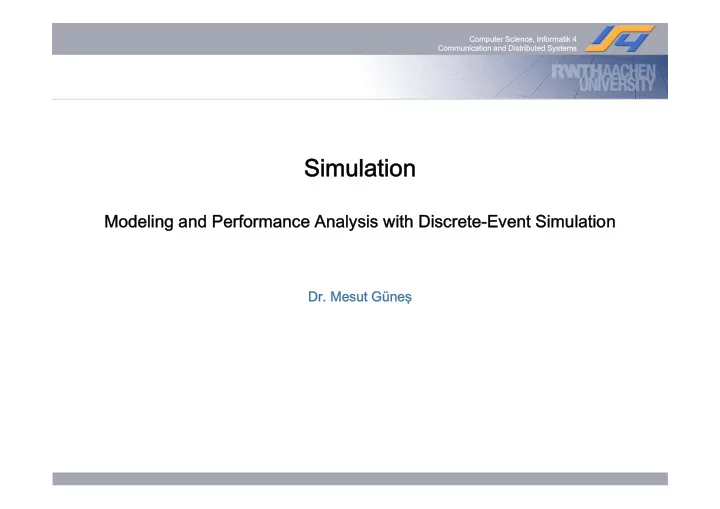

Computer Science, Informatik 4 Communication and Distributed Systems Simulation Modeling and Performance Analysis with Discrete-Event Simulation Dr. Mesut Güneş
Computer Science, Informatik 4 Communication and Distributed Systems Chapter 0 Organizational
Computer Science, Informatik 4 Communication and Distributed Systems Research topics Research topics � Network Architectures and Communication Protocols • Wired networks - Local Area Network (LAN), Wide ( ), Area Network (WAN), Internet • Wireless networks - GSM, 3GPP Internet - Wireless Local Area Network (WLAN) - Mobile Ad-hoc Network (MANET), Wireless Mesh Network (WMN), ( ), Wireless Sensor Network (WSN) • Protocols - HTTP, TCP/UDP, IP - IEEE 802.11a,b,g IEEE 802 11 b Sensor • Internet of Things - Anytime, Anywhere, Anything MANET MANET Dr. Mesut Güneş Chapter 0. Organizational 3
Computer Science, Informatik 4 Communication and Distributed Systems Research topics Research topics � Relationship to other courses of Informatik 4 Relationship to other courses of Informatik 4 Distributed Systems Networking (other) Security Data Multimedia Mobile Communication Communication Communication Communication Simulation Simulation Modeling and Evaluation Measurements Dr. Mesut Güneş Chapter 0. Organizational 4
Computer Science, Informatik 4 Communication and Distributed Systems Topic of this course Topic of this course � Given a system, how do you evaluate its performance? Given a system, how do you evaluate its performance? System System How to evaluate? Experiments Analysis Simulation Develop a mathematical Develop a computer program Use existing instance of the abstraction of the system and which implements a model of system to perform derive formulas which the system. Perform performance measurements. describe the system experiments by running the performance. computer program. Dr. Mesut Güneş Chapter 0. Organizational 5
Computer Science, Informatik 4 Communication and Distributed Systems Topic of this course Topic of this course � Open questions Open questions • What is a system? • What is a model? • What is performance and how to measure it? • On what does performance depend? • How to build a model? Ho to b ild a model? • How to numerically evaluate it? • How to interpret such results? How to interpret such results? Dr. Mesut Güneş Chapter 0. Organizational 6
Computer Science, Informatik 4 Communication and Distributed Systems Topic of this course Topic of this course � At the end of this course, you should … , y • know about simulation principles • be able to build models of systems • be able to identify suitable performance metrics be able to identif s itable performance metrics • be able to design and implement simple discrete event simulation programs • have some experience with a modern simulation tool • be familiar with basic statistical questions • know how to evaluate simulation results know how to evaluate simulation results • be aware of common pitfalls � Focus is on practical aspects of implementing a simulator and simulation programs. Dr. Mesut Güneş Chapter 0. Organizational 7
Computer Science, Informatik 4 Communication and Distributed Systems Topic of this course Topic of this course � This course does not deal with/is not a This course does not deal with/is not a • mathematical analysis tools for performance evaluation • experimental approaches • probability and statistics course • programming course • computer networking course comp ter net orking co rse � However all these topics will be touched or needed in some However, all these topics will be touched or needed in some degree. Dr. Mesut Güneş Chapter 0. Organizational 8
Computer Science, Informatik 4 Communication and Distributed Systems Contents of the course Contents of the course � Introduction to Simulation Introduction to Simulation � Simulation Examples � General Principles of Discrete-Event Simulations p � Statistical Models in Simulations � Queueing Models � Random-Number and Random-Variate Generation � Input Modeling � Verification and Validation of Simulation Models � Output Analysis � Simulation of Computer Systems S f C S � Simulation of Computer Networks Dr. Mesut Güneş Chapter 0. Organizational 9
Computer Science, Informatik 4 Communication and Distributed Systems Organizational Organizational � Lecture Lecture • Friday, 10:00 – 11:30, Room 5052 � Exercise • Wednesday, 15:30 – 17:00, AH V, Fortnightly � Literature and Materials • All materials to this course is available on the website http://www-i4.informatik.rwth-aachen.de/ � Relation to CSE II • This course constitutes the first part of Communication Systems Engineering II given by Prof. Wehrle Dr. Mesut Güneş Chapter 0. Organizational 10
Computer Science, Informatik 4 Communication and Distributed Systems Prerequisities Prerequisities � Necessary Necessary • Basics of probability theory and statistics • Programming language - C/C++ - Java - Python Python • Spreadsheet tools - OpenOffice.Calc - MS Excel � Helpful � Helpful • Data communication • Computer networks Computer networks Dr. Mesut Güneş Chapter 0. Organizational 11
Computer Science, Informatik 4 Communication and Distributed Systems Literature Literature � Main source of this course: Main source of this course: • Jerry Banks, John Carson, Barry L. Nelson, David Nicol, y Discrete-Event System Simulation , Fourth Edition, Prentice Hall Prentice Hall � General book on simulation with applications on with applications on • Manufacturing • Computer systems Computer systems • Communication networks Dr. Mesut Güneş Chapter 0. Organizational 12
Computer Science, Informatik 4 Communication and Distributed Systems Literature Literature � Second source of this � Second source of this course: • Averill M Law W • Averill M. Law, W. David Kelton, Simulation Modeling g and Analysis , McGrawHill � General book on simulation Dr. Mesut Güneş Chapter 0. Organizational 13
Computer Science, Informatik 4 Communication and Distributed Systems Literature Literature � A Varga A. Varga • OMNeT++ Object-Oriented Discrete Event Simulator http://www.omnetpp.org/ � Homepage of the simulator we will use in the course: • Download for Linux and Wi d Windows • Contains manuals and other documentation other documentation Dr. Mesut Güneş Chapter 0. Organizational 14
Recommend
More recommend